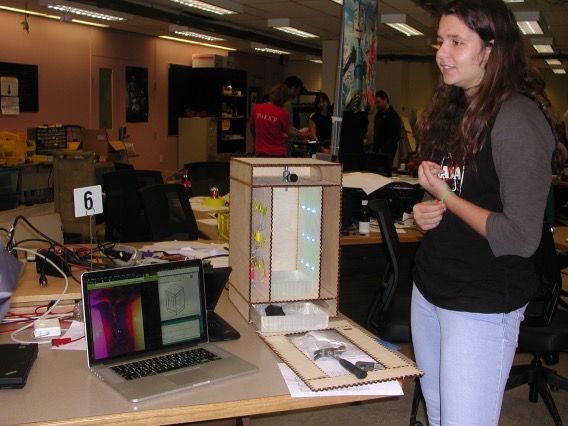By Gary Robbins
The San Diego Union-Tribune
WWR Article Summary (tl;dr) As Gary Robbins reports, “[Francisca] Vasconcelos was named a 2020 Rhodes Scholar, becoming part of an international fellowship whose alumni include Nobel laureates, an American president, the co-inventor of GPS, and the namesake of the Hubble Space Telescope.”
The San Diego Union-Tribune
When she was a student at Torrey Pines High School, Francisca Vasconcelos found a way to modify a drone so that its camera would follow her around a soccer field, catching her fancy footwork.
It represented the kind of smarts and ingenuity that got her into MIT, where she has been helping push the boundaries of quantum computing as an undergraduate.
That work also has drawn attention.
Late Saturday, Vasconcelos was named a 2020 Rhodes Scholar, becoming part of an international fellowship whose alumni include Nobel laureates, an American president, the co-inventor of GPS, and the namesake of the Hubble Space Telescope.
The 21 year-old Vasconcelos was one of 32 Americans who were chosen from more than 2,900 applicants to become part of next year’s class.
In a tradition dating back more than a century, the American scholars will join students from other parts of the world to do degree work at England’s Oxford University, which has been teaching classes for more than 900 years.
It is not the only fellowship of its kind. But it is widely considered to be the most prestigious. And it is famously selectively, reminding applicants on its website that its search committees ignore “trophy hunters” and “academic tourists” and choose hard core scholars.
“I’m a bit overwhelmed and kind of in shock,” Vasconcelos told the Union-Tribune on Sunday. “I wasn’t expecting it. The Rhodes committee has a very long tradition of primarily taking students involved in policy and social work. I’m in STEM.
I’m so excited that I’ll be going to Oxford.”
She’s no stranger to academia. Her father is Nuno Vasconcelos, a UC San Diego professor who specializes in computer vision. Her mother is Manuela Vasconcelos, who teaches engineering at UCSD.
The couple earned graduate degrees in Boston, where Francisca was born. The family later moved to San Diego, where their daughter faced a tough decision when choosing where to go to high school.
“I was looking at Torrey Pines, which is known for STEM and athletics, and Canyon Crest Academy, which is known for the arts,” Vasconcelos said.
“I arbitrarily chose Torrey Pines, and by my sophomore year I was working on science projects and getting involved in science fairs, which boosted my confidence. My main passion was playing soccer.”
She went on to MIT, partly because her parents had studied in Boston, partly because the school offered a great financial aid package, and partly because of the academic atmosphere.
“MIT doesn’t just teach the material, it teaches you how to think,” said Vasconcelos, who is still finding time for club soccer.
She currently draws from physics, computer science and information theory to seek advances in quantum computing, a rapidly evolving field that is expected to produce far faster and more efficient ways to process and analyze data than classical computers. Engineers say the field could improve everything from the development of pharmaceutical drugs to large scale agriculture.
The importance of the work is reflected in the fact that two other MIT students who work in the same broad area were also named 2020 Rhodes Scholars.
At Oxford, Vasconcelos will spend two years earning two masters degrees, one in the mathematics and foundation of computer science, the other in statistical science.
Vasconcelos, who is Portuguese-American, has been to Europe several times, but has never visited Oxford, or been in the spotlight this way.
“I got a bajillion messages from friends and faculty congratulating me,” she said. “I’m just beginning to realize the pressure there will be to live up to expectations. During the interview process, the committee didn’t ask me about technological progress. They asked about the ethics of working in technology, and the political and social impact of the work, and what I could do to be a leader.”
Her father, Nuno, believes it will be a transformative experience for his daughter, saying, “She’ll be exposed to not only people from engineering but so many other disciplines. It will make her more aware of the societal implications of technology and the ramifications of her work.”
Minorities make up the majority of the latest group of U.S. college students to be named Rhodes Scholars, and the class includes the first transgender woman selected for the prestigious program.
The Rhodes Trust announced the 32 selections late Saturday after two days of discussions with applicants from 90 different colleges and universities across the country.
Along with University of Tennessee graduate Hera Jay Brown, who is the first transgender woman in the program, this year’s class also includes two non-binary scholars.
“As our rights and experiences as women are under threat, this moment has given me pause to reflect on what an honor it is to pave this path,” Brown posted on Twitter after the announcement.
The 32 scholars chosen will start at least two years of all-expenses paid study next fall at Oxford, along with students from over 60 countries.
The studies undertaken by the scholars include research into the escape from danger reflex in zebrafish to better understand how the human brain deals with stress and how to make computer vision more human-like.
The research also includes studies into human behavior, including the prevalence of sex work among refugees, the impact of nuclear testing on the American Southwest, how to use online cryptocurrency to improve conditions in the world’s largest Syrian refugee camp and defending the rights of migrants to the United States.
The Associated Press contributed to this story.
___
Distributed by Tribune Content Agency, LLC.














































































































































































































































































































































































